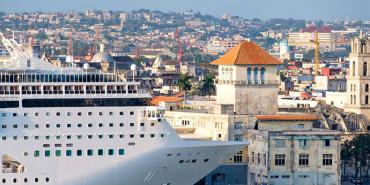By JOHN HAUGHEY THE CENTER SQUARE

Cruise ship docked at Port of Old Havana
From Florida docks to Wall Street stocks, the Trump administration’s new restrictions on travel to Cuba have fostered confusion and, in some cases, impromptu itinerary changes for passengers on Havana-bound cruise ships at sea.
But despite the loss of a new port-of-call that was gaining in popularity, the Cuba travel ban should have little overall impact on Florida’s $8 billion a year cruise industry.
The U.S. Commerce Department says that passenger and recreational vessels and private and corporate aircraft no longer will be allowed to travel to Cuba.
“Cuba continues to play a destabilizing role in the Western Hemisphere, providing a communist foothold in the region and propping up U.S. adversaries in places like Venezuela and Nicaragua by fomenting instability, undermining the rule of law, and suppressing democratic processes,” U.S. Treasury Secretary Steven Mnuchin said in a news release announcing the ban.
Many passengers booked to depart on cruises to Cuba last week didn’t learn of the ban until they showed up at Florida docks. Cruise ship passengers at sea bound for Cuba were rerouted to Mexico.
Major cruise lines immediately began dropping Cuba from itineraries — affecting an estimated 800,000 bookings through the next two years, according to Cruise Lines International Association [CLIA].
The fallout was felt on Wall Street where stocks of all 16 cruise lines that offer Cuba cruises, or cruises that visit Cuba as a port-of-call, took a hit.
“This is going to have a noticeable impact on the cruise lines’ earnings this quarter and the rest of this year and likely into 2020,” Henry Harteveldt, a travel analyst with Atmosphere Research Group, told the Associated Press.
Cruises from the U.S. to Cuba have only been permitted since May 2016, when the Obama administration lifted a long-standing ban on Americans traveling to the communist nation.
In the first four months of this year, according to the Florida-Caribbean Cruise Association, nearly 143,000 people arrived in Cuba by ship from Florida, an increase of more than 300 percent over the same period last year.
But Cuba trips represent a relatively small percentage of cruises offered by nearly 200 cruise-liners from Florida’s five main cruise ports — Jacksonville, Cape Canaveral, Fort Lauderdale, Miami, Tampa — where, according to the CLIA, more than 7 million people embarked in 2016, accounting for 61 percent of embarkations at all U.S. ports.
According to CLIA, the world’s largest cruise industry trade association, the cruise industry’s direct expenditures in Florida created 149,020 jobs and $7.1 billion in wages and salaries in 2016.
More than 11.5 million passenger and crew visits from cruise ships to Florida ports in 2016 produced another $1.05 billion in onshore spending, CLIA reports.
The cruise industry in 2016 directly employed nearly 21,000 Floridians, representing approximately 60 percent of the total employment of all cruise lines in the U.S, according to the CLIA.
An example of the cruise industry’s ripple effects in creating nearly 150,000 jobs is its $1.7 billion in purchases from Florida food and beverage wholesalers, petroleum providers and manufacturers that make soap, cleaning and toiletry products specifically for shipboard use.
Florida’s two U.S. senators, both Republicans, praised the ban, placing geopolitical security issues over immediate economic concerns.
“The Trump administration deserves tremendous credit for holding accountable the Cuban regime,” Sen. Marco Rubio said. “The United States must use all tools available under U.S. law to counter the Cuban regime’s deceitful activities to undermine U.S. policy.”
“Cuba continues to be the most powerful force propping up [Venezuela President] Nicholas Maduro as he starves and kills his own people,” said Sen. Rick Scott, who has suggested a different type of U.S. based-ships cruise to Cuba – the U.S. Navy – and blockade the island nation to limit Venezuela’s oil sales.
U.S. Rep. Charlie Crist – a former Republican who is now a Democrat – released a joint statement with fellow Florida Democratic U.S. Rep. Kathy Castor, opposing Trump’s move.
“Banning U.S. cruise lines and most Americans from traveling to Cuba hurts Florida’s economy and is a major step backwards for U.S.-Cuba policy,” the statement said. “The American people are our best ambassadors for spreading democracy and freedom.”
Rolling back the 2016 Cuba re-engagement policy will “push an island nation 90 miles off our shores further into the hands of our adversaries,” Crist and Castor said. “Americans can travel to Moscow, Beijing, virtually anywhere in the world, but not Havana? It doesn’t make sense.”
John Haughey is the Florida contributor to The Center Square.








